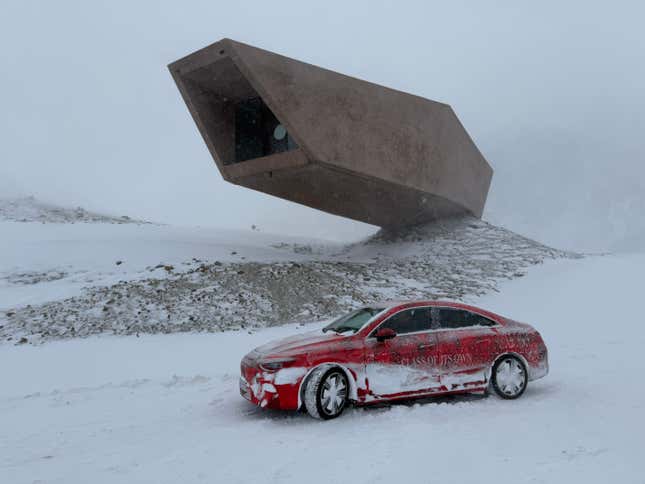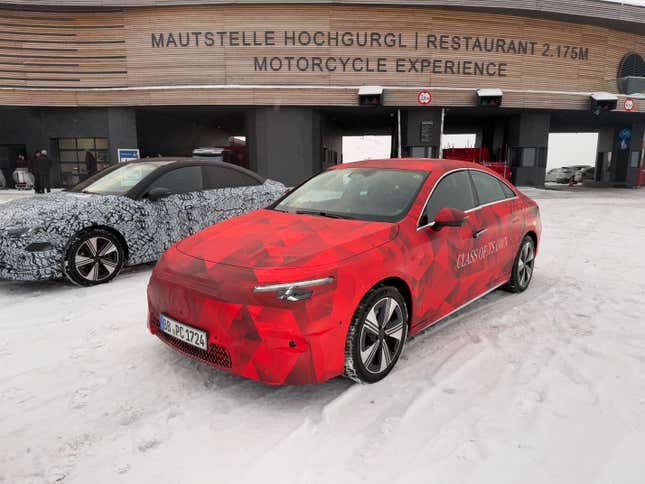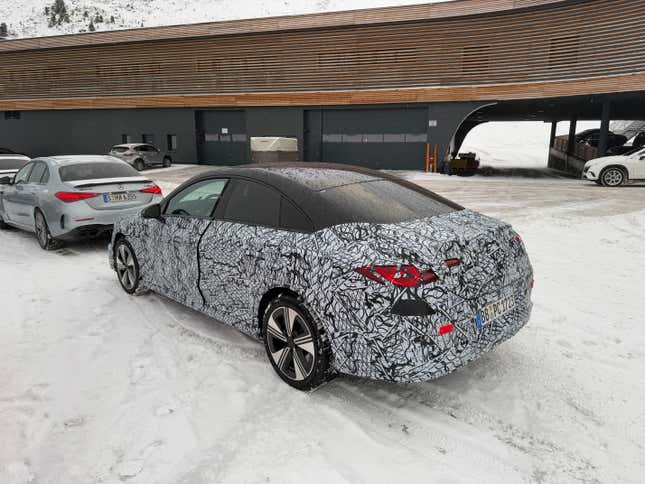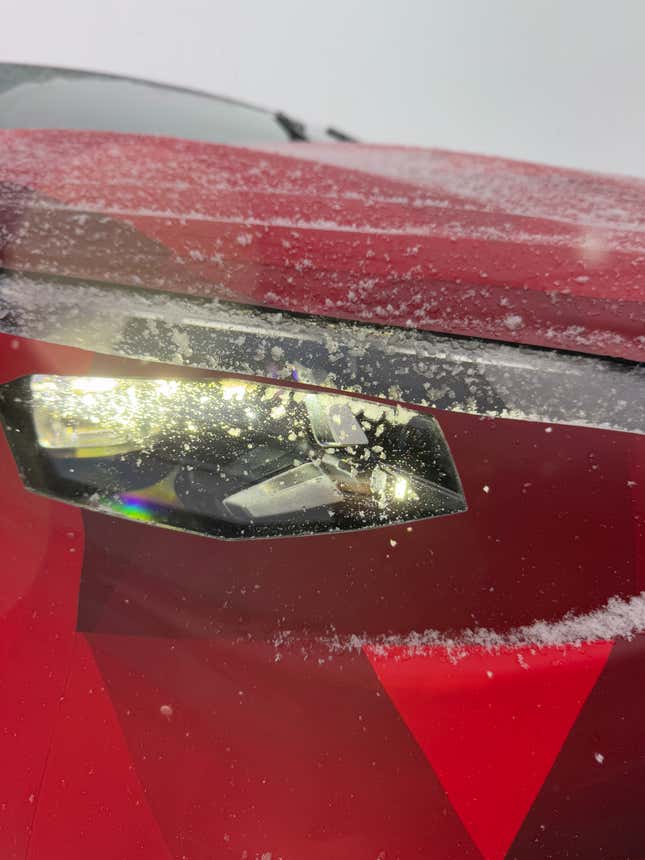Electric Mercedes-Benz CLA Could Be A Breakthrough Moment

Typically, when I get to do a ridealong in a new car, prototype or otherwise, the car is actually, you know, in motion. Today though, sitting in the passenger seat of a camouflaged prototype of the upcoming third-generation Mercedes-Benz CLA, we’ve spent most of the drive route completely stopped. That’s not anything to do with the car itself, but rather the conditions. With head of the electric drive system Timo Stegmaier at the wheel, we’re trying to drive up the Timmelsjoch mountain pass in Austria but keep having to stop due to total whiteouts.
Normally that would suck, but it gives me a lot more time to talk to Stegmaier about the new CLA, which is one of the most important new models that Mercedes will launch this decade. Entering its final validation phase of testing, the CLA is a concept car made real, not only because its styling and specs closely adhere to the Concept CLA that debuted last fall, but because its electric motors, batteries, operating system and other components were developed through real-world testing of the groundbreaking Vision EQXX.
Full disclosure: Mercedes-Benz flew me to Germany to see the opening of its new Manufaktur studio, and then we drove to Austria where we spent one night sleeping in fancy RVs and another in a fancy hotel so we could ride in the new CLA and test out a bunch of other Mercedes models in the snow.
Photo: Daniel Golson/Jalopnik
Judging by the pair of lightly camouflaged CLA EV prototypes that Mercedes is driving us around in, the production car will look pretty much identical to the concept, just with the sci-fi styling attributes slightly toned down. It’s the sleekest CLA silhouette yet with a wonderful greenhouse and improved proportions, and the concept’s star-shaped headlight and taillight motif has been preserved, thankfully. Expect a similar grille-less nose treatment to the concept as well, hopefully with lots of illuminated stars. Mercedes will continue to offer the CLA in real colors, too — underneath the red camo wrap was bright blue paint.
I’m not allowed to talk about what the CLA’s interior is like below the beltline, though it was covered up anyway, but I can say that the CLA has maybe the most expansive panoramic sunroof I’ve ever experienced, especially in a small car. It didn’t seem to affect headroom too much, either. Already confirmed by Mercedes, the CLA will be its first production car with a pillar-to-pillar display like the ones in the EQXX and Concept CLA, and it will be the production debut of the brand new MB.OS operating system. I can also say that the CLA is extraordinarily quiet inside, rivaling the S63 that I drove earlier in the morning. Yeah, electric cars are just inherently more quiet inside than gas ones, but it’s a night and day difference compared to the outgoing CLA. Surely a lot of the silent-ness has to do with the CLA’s aerodynamics and aspects like the incredibly flush B-pillar and side window glazing. Oh, and there will be a “sizeable” frunk.

Photo: Daniel Golson/Jalopnik
It rides on the new Mercedes Modular Architecture (MMA) platform, which is described as being “electric first” — there will be internal-combustion models that pair a turbocharged engine with a 48-volt hybrid system, but the CLA was designed with the fully electric version as the better and more important model. One of the most exciting parts of MMA is that the entry-level versions of the CLA will be rear-wheel drive with a single motor powering the rear axle, unlike all previous gas-powered base CLAs that have been front-wheel drive. (The gas CLAs will probably still be FWD, though.) Developed and produced in-house by Mercedes, that rear motor will make 268 horsepower, 47 more than the current CLA250’s turbo four, and it has a two-speed transmission that’s a huge boon for efficiency. A second 107-hp motor at the front axle is optional, described as a “boost” motor that engages when needed either for better performance or traction.
Despite the whiteout conditions, slick ice patches and deep snowy ruts, the all-wheel-drive CLA I’m riding in never has a single issue with traction, making it around the corners better than some other 4Matic-equipped cars I’ve driven at this program. Going uphill from a stop, Stagmaier is able to accelerate fairly quickly in a straight line, which is more impressive than it sounds. There are even a couple of points where we’ve inadvertently driven into a deep snowbank, and the CLA is able to drive itself out with ease. There’s no fake spaceship-like EV noise, or even any real noise from the motors. Just silent, smooth, easy acceleration. The regenerative braking system is also overhauled, with full one-pedal driving and a new auto mode that uses route guidance and other real-time info to adjust the amount of regen on the fly. Instead of paddles, the regen is now selected by pulling on the column-mounted gear shifter, which also now has the start/stop button on it.

Photo: Daniel Golson/Jalopnik
In the U.S. we’ll only get an 85-kWh lithium-ion battery pack that’s 20 percent more energy dense than the EQ lineup’s packs, but other markets will have the option for a smaller LFP battery as well. Mercedes smartly decided to give the MMA platform an 800-volt architecture, avoiding the mistake made by other brands of using a 400-volt setup, so it’ll be able to fast-charge at up to 320 kW and gain over 186 miles of range in just 10 minutes. (The concept touted 250 miles in 15 minutes, which should be achievable.) Under the rear-fender flap you’ll find both a J1772 port for Level 1 AC charging and an NACS port for DC fast-charging, and the car will come with a CCS adapter. Also important for wintery conditions like these is a new heat pump that uses waste energy from the motors and battery to power the climate control in a more efficient way.
Mercedes won’t say just how slippery the CLA is, but I’m expecting one of the lowest drag coefficients in the industry, especially given how the current-gen CLA already has a super-low 0.23 coefficient. While U.S.-spec specs aren’t available yet, the CLA will have a range of over 466 miles on the European WLTP, which could translate to at least 400 miles from the EPA, dozens better than its EQS sibling. Even more impressively, it’ll have an average energy consumption figure of 5.2 miles per kWh, handily beating the Hyundai Ioniq 6 and Lucid Air. Pair that together with its rapid charging speeds and long range, and the CLA could be one of the most efficient EVs on sale by any measure.

Photo: Daniel Golson/Jalopnik
That efficiency is already proving itself in the real world. On testing days like what I’m experiencing in the Alps, which is a hugely important test location for the brand, all the engineers will get together in the evenings to report on how their days went. Stegmaier says there were many times where one of his colleagues would say, “Today, I couldn’t do my charging test because the car is too efficient even up and down the mountain.” Recently, a camouflaged CLA prototype set an endurance record by traveling 2309 miles in 24 hours on the Nardò oval circuit, longer than the distance between Los Angeles and Chicago and 181 miles longer than the Porsche Taycan’s old record. The CLA was driven at its 130-mph top speed, at which Stagmaier says the car is operating at 93-percent efficiency, and it stopped to charge 40 times, taking about 10 minutes per charging session stop.
Taking the stops into account, the electric CLA traveled at an average speed of 96 mph. In that 24-hour record run, Mercedes’ engineers optimized the ideal length and number of charging stops for the greatest time efficiency, which it says means more to consumers than range or charging speeds really do. The CLA only traveled about 60 miles between stops, with the battery going down to 10 percent and being charged back up to around 55 percent, because this was more time efficient than driving for longer but making longer charging stops. The production car’s navigation system will offer routes based on the time efficiency, so you’ll only stop when and for as long as you really need to. For instance, starting with a full battery and making two ten-minute stops, a prototype CLA covered nearly 800 miles.
Mercedes will officially reveal the new CLA in the spring, with the car set to go on sale later in 2025. It will be followed by next-gen versions of the GLA and GLB crossovers, as well as a new CLA Shooting Brake — Mercedes, I’m begging you to bring that to America — that will share its electric-first platform and approach. With its mix of high efficiency, style and technology, the new CLA could be a breakthrough moment for the brand, and maybe even EVs as a whole. And hey, at least you know it can handle a snowstorm, too.

Photo: Daniel Golson/Jalopnik

Photo: Daniel Golson/Jalopnik

Photo: Daniel Golson/Jalopnik

Photo: Daniel Golson/Jalopnik

Photo: Daniel Golson/Jalopnik

Photo: Daniel Golson/Jalopnik

Photo: Daniel Golson/Jalopnik

Photo: Daniel Golson/Jalopnik

Photo: Daniel Golson/Jalopnik




